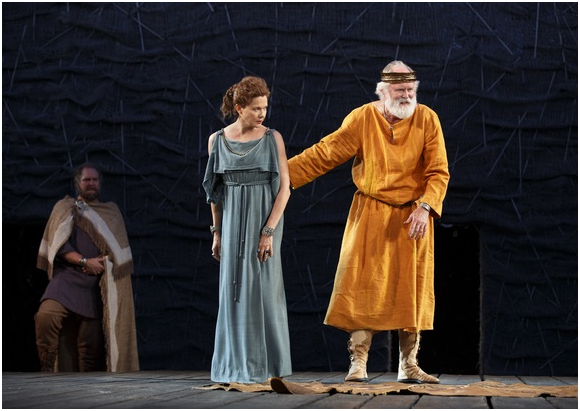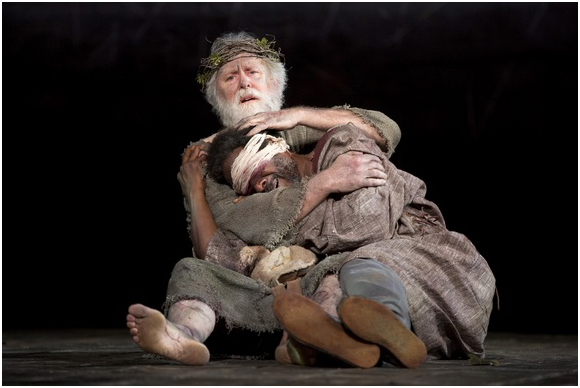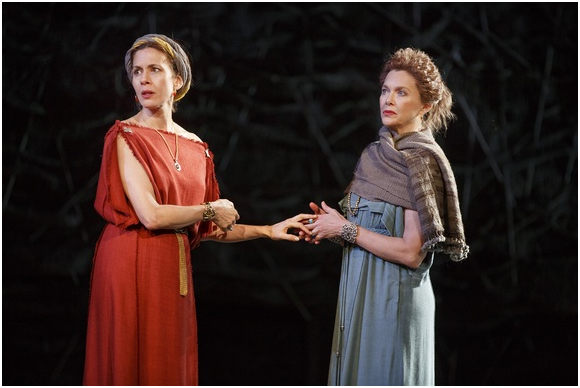King Lear

Jay O. Sanders, Annette Bening and John Lithgow
in a scene from King Lear
(Photo credit: Joan Marcus)
The Public Theater’s King Lear, the second Shakespeare in the Park offering of the summer of 2014, was eagerly awaited for four reasons. In the title role, it marks John Lithgow’s return to the park for the first time since 1975, as well as Annette Bening’s return to the New York stage after a 26 year hiatus making films. It is also the first Delacorte Theater King Lear since 1973. And finally director Daniel Sullivan has done wonders with such recent Shakespeare in the Park revivals as The Comedy of Errors, All’s Well That Ends Well, The Merchant of Venice and Twelfth Night. While the production is unfussy, coherent and lucid, it is also colorless, unimaginative and bland, a real surprise from such talent. Part of the problem is that most of the well-known featured actors have their own styles and seem not to be in the same production.
King Lear may be Shakespeare’s darkest tragedy with its tale of an aged king who foolishly, not knowing his three daughters’ true characters, plans to divide his kingdom between them and then live with them alternately. Unfortunately, the two older married daughters flatter him hypocritically while Cordelia, the third, unmarried and youngest daughter who really loves him, refuses to play the game. Banishing Cordelia who is immediately snatched up in marriage by the King of France, he divides the kingdom between the two greedy, heartless daughters. What follows leads to madness, violence, torture and death as well as destruction of the old order. It is Shakespeare’s study of old age and ingratitude, devastating in its unequivocal directness and unrelieved focus.
Sullivan’s production never reaches tragic heights. The first problem is the setting by John Lee Beatty – a huge wooden platform backed by a metallic wall pierced by hundreds of huge needles or spears. Aside from being devoid of atmosphere, mood or time period, it causes the actors to appear dwarfed by its size. So large is the space that the court scenes look empty as though Lear’s kingdom is already in poverty long before he finds himself destitute in the heath scene in the middle of the play. Susan Hilferty’s nondescript tunics (with each character in a different solid color) which suggests no time period, also places the play in a sort of historical vacuum. Visually the production is as unimaginative as the staging.

John Lithgow as Lear and Clarke Peters
as Gloucester in a scene from King Lear
(Photo credit: Joan Marcus)
Lithgow seems an unusual choice for Lear both considering how little Shakespeare he has performed in his distinguished career and how completely he is associated with contemporary roles. To his credit, he has undeniable stage presence and establishes Lear’s arrogance and sense of entitlement from his very first appearance. He has also created an arc that takes him from overweening pride into his decline into madness and humility. Unfortunately, Lithgow never achieves tragic grandeur: much of the time his Lear seems to be comically observing the changing world around him without showing how much he has lost, other than his retinue and followers. He is not a bad Lear – he just hasn’t scaled the heights.
As Lear’s oldest daughter Goneril, Bening plays her like an imperious suburban matron. This only works so far in this context as the ruler of half the kingdom. As the middle sister Regan, Jessica Hecht is also like a rather childish suburban matron who needs to have everything explained to her but she adds a comic touch making the part more ironic than it usually is. More at home in her role, Jessica Collins as Cordelia, the cast-off younger daughter, is not only regal but also gives tragic dimensions to her princess, lacking in the other actresses. Unfortunately, Shakespeare keeps her off stage for most of the play.

Jessica Hecht as Regan and Annette Bening
as Goneril in a scene from King Lear
(Photo credit: Joan Marcus)
Several of the actors give notable performances. As Lear’s Fool, Steven Boyer is forthright and blunt, a veritable voice of reason. Jay O. Sanders is an excellent Earl of Kent, the loyal follower of Lear, who though banished by him continues to serve him in disguise. His Kent is always forceful, always a moral center to the play. While Clarke Peters seems too modern as the Earl of Gloucester, Chukwudi Iwuji as his legitimate son Edgar given the short end of the stick and later disguised as Poor Tom, a homeless beggar, is commanding and involves us in his plight. As his half-brother, the venomous bastard son Edmund, Eric Sheffer Stevens does not seem to be enjoying his evil very much. Jeremy Bobb as Oswald, Goneril’s steward, is a stalwart loyal retainer while Christopher Innvar as Goneril’s husband, the Duke of Albany, is an upright but lackluster lord. Glenn Fleshler as Regan’s husband, the Duke of Cornwall, is rather one dimensional in his rapaciousness.
While Sullivan does not seem to have turned his company into a coherent ensemble, the production is always easy to understand and unambiguous. The diction is always clear, though at times the sound design by Acme Sound Design seems to be at the wrong level. King Lear is a difficult play to bring off with its unrelieved outsized tragedy, and using actors not practiced in interpreting Shakespearean roles may not be the best casting. It is also possible that the production will achieve greater depth as the performers have more onstage time. This is a King Lear more than a little disappointing from such a talented group of theater artists.
King Lear (through August 17, 2014)
Shakespeare in the Park
The Public Theater at the Delacorte Theatre in Central Park: enter at 81 Street and Central Park West or 79th Street and Fifth Avenue, in Manhattan
Free tickets distributed at Noon at the Delacorte Box Office to those on prior line or by lottery at http://www.publictheater.org

Leave a comment